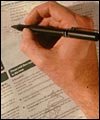| happen |
 |
||||||
|
Ruben
from Italy asks: 1.
What happens when the contract will be expired? Also, can I use happen like this? 5. I don't happen to be a teacher.
|
| Roger replies: | ||
|
In your first four listed examples above, Ruben, you are referring to future time, but only 2 and 3 are grammatically correct. Let's look at the arrangement of structures in your second sentence. |
||||
When
behaves like if in subordinate clauses of this kind and remains
in the present tense when we are referring to a future condition.
Consider the following:
|
||||
Let's
look now at the arrangement of structures from your third sentence.
If we are discussing a general truth, rather than a specific instance
or event, the main clause usually remains in the present tense as
well as the tense in the if or when clause. Consider
the following:
|
||||
|
For your fourth sentence, remember: no does/do/did when what/who question refers to the subject. When
'wh-' questions, like what, who or which, refer
to the subject of the sentence, we do not use the auxiliary forms
do/does/did. These auxiliaries are used only when the wh-question
refers to the object. Compare the following:
|
||||
Four
fifth sentence happen can be used with a following infinitive
to suggest that something may happen by chance. Consider the following:
|
||||